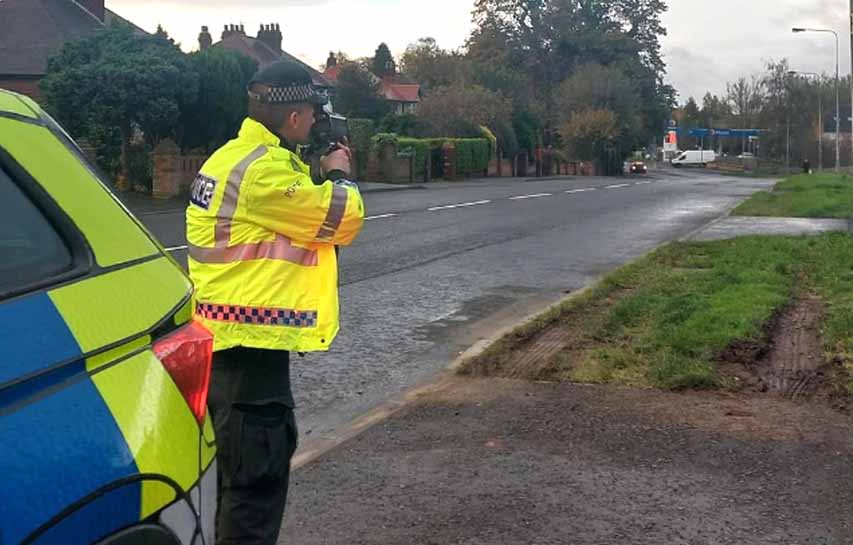Vehicle Speed is key focus for for Road Safety Week
Slow down to save lives!
That is the message this Road Safety Week (19-25 November) from the Department for Infrastructure (DfI) and the emergency services.
The collective call comes as figures reveal that 310 people have been killed or seriously injured on our roads because of speeding in the past five years (2018-22).
Every 1mph reduction in average speed has a resultant 5% reduction in collisions which could, quite literally, be the difference between life and death.
DfI Permanent Secretary, Denis McMahon, said it was time to have honest conversations with ourselves, and others, about speeding and the life-changing consequences it can have.
He said: “Too many families are living with the devastation caused by those who choose to speed.
“Sadly, there are too many people who feel it is acceptable, and even harmless, to speed.
“But the truth is that it’s neither of those things and that attitude must be challenged if we are to reduce the number of deaths on our roads.
“Whatever the circumstances of any collision, whether on a rural or urban road, speeding will always make the consequences worse and could make the result deadly.

“Speed limits are set for our safety and we must all be mindful that they are the absolute maximum at which we should travel.
“Every time we drive faster than the speed limit, or too fast for the weather or road conditions, we increase our risk of crashing, which in turn increases the risk of someone being killed or harmed on the road.
“Put simply, the faster you drive, the greater the stopping distance and the harder you will hit something – or someone.”
Head of Road Policing, Chief Inspector Graham Dodds said: “Our message is for everyone to take personal responsibility for road safety. If everyone stops speeding, more people live.
“Removing excess speed should be the easiest thing that every road user can do. If we all stop speeding, more people live and fewer people have to contend with life-changing injuries.
“We see far too often the devastating impact of serious and fatal road traffic collisions and how lives are changed in an instant.
“As drivers, we all have a part to play in making our roads safer for everyone.
“The consequences of causing serious injury or worse, death, due to speeding are simply not worth it.”
Rosie Byrne, Director of Operations with the Northern Ireland Ambulance Service,said: “It is disappointing, despite the evidence that has been presented over many years of the dangers involved, that so many people continue to speed on our roads.
“Every mile per hour over the speed limit puts the driver, their passengers and other road users at risk of serious, life-changing injury or even death.
“Ambulance crews attend too many incidents where carnage has ensued because of the actions of those who do not grasp the seriousness of speeding. Some people foolishly believe that it is worth the risk to make up some time when they are running late, only to find that they may never arrive at their destination at all.
“Some people speed because of the perceived thrill, which is all too often brought to a sudden end when they hit something or, worse still, someone.
“Driving on our roads is not a game where you can pause and hit rewind to do it better next time. Speeding has consequences. Please think about it before you start your journey and realise it is always much better to arrive late and alive than not to arrive at all.”
Northern Ireland Fire & Rescue Service (NIFRS) Area Commander Suzanne Fleming said: “Our Firefighters are regularly called to attend road traffic collisions to rescue people trapped inside their vehicles. Along with our colleagues in other emergency services we witness first-hand the carnage on our roads and the lives completed destroyed as a consequence.
“During this time of year, we are faced with challenging weather and road conditions, such as flooding and black ice, that can lead to more collisions on our roads.
“As road users, we all have a personal responsibility to do all we can to ease the pain, loss and suffering to individuals, families and communities caused by road traffic collisions.
“We are urging you to drive to the road conditions, don’t speed, allow more time for your journey and don’t get distracted when driving.”
Evidence shows that more than nine out of 10 crashes are caused by human error.
The decisions we make when using the road. Therefore, the majority of road traffic collisions are avoidable and we can be the difference if we slow down, pay attention, and never, ever drink alcohol or take drugs and drive.
This Road Safety Week, the Department encourages people to take the ‘Road Safety Pledge’ to be as safe as possible on the road.
By signing up to the Share the Road to Zero pledge, you are committing to be the best road user than you can be – whether as a driver, passenger, pedestrian, cyclist, motorcyclist or horse rider, and adopt positive road user behaviours.
Share the ‘Road to Zero’ is a road safety community engagement programme that encourages all road users to take personal responsibility for their own safety and by doing so also the safety of others on our roads.
Pledging is quick, easy and free at:
www.sharetheroadtozero.com and you will join with the many others, both individuals and organisations, who receive regular advice on how to stay safe as you use the road.
























